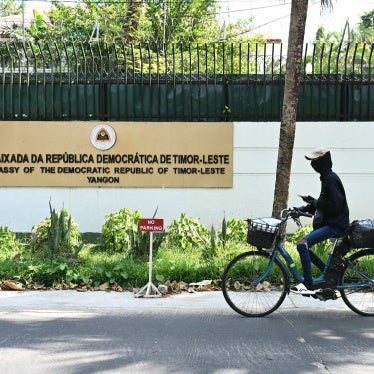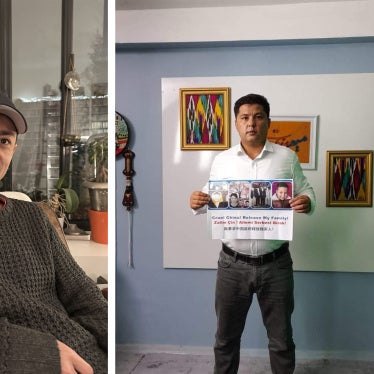The following letter was sent by Human Rights Watch and nine other non-governmental organizations (NGOs) to French Foreign Minister Alain Juppé, concerning a draft law which would severely restrict the activities of NGOs in Cambodia.
August 23, 2011
Alain Juppé
Minister of Foreign Affairs
Ministère des Affaires étrangères et européennes
37 Quai d’Orsay
75007 Paris
French Republic
Re: New law threatening the operations of NGOs and associations in Cambodia
Dear Foreign Minister,
We write to bring your immediate attention to very serious developments in Cambodia concerning the recently released third draft of the Law on Associations and NGOs, which is now before the Cambodian Council of Ministers for consideration. The implications of this law could not be more serious. As written, it will allow the Royal Government of Cambodia (RGC) to intimidate and potentially shut down local, national and foreign NGOs, associations, and informal groups that criticize the government or government officials.
There is little time before the Council of Ministers sends this flawed draft law to the National Assembly for final adoption. As such, we urge you to:
- Press the RGC to end efforts to promulgate this law.
- Make it clear to the RGC that if the law is adopted in its current form your government will reassess your bilateral assistance and will also urge all agencies providing multilateral assistance, including the United Nations and international financial institutions, to reassess their assistance, with a particular emphasis on projects involving RGC agencies.
As national development contributes to growth in commerce and industry, it should also benefit the wider population. Civil society actors, both local and foreign, play a vital role in this development through monitoring, community development, poverty alleviation, humanitarianism, research, and advocacy. The draft law threatens to severely restrict civil society’s right to freedom of association and expression, therefore preventing civil society organizations and NGOs from fulfilling these roles. As such, the law will limit the ability of Cambodia’s development partners to ensure that programs reach their intended grass-roots beneficiaries.
Efforts to ensure transparency and accountability in project implementation will also likely be negatively affected as civil society groups monitoring government projects face tighter, and potentially hostile, government scrutiny. Human rights-centered approaches to local development will be at risk. In the year marking the 20th anniversary of Paris Agreements that ended Cambodia’s civil war and launched the United Nations Transitional Authority in Cambodia (UNTAC), this law threatens one of UNTAC’s most enduring legacies – creation of a thriving NGO community and the blossoming of voluntary, community-based civic groups, informal associations and grassroots networks.
In fact, if the RGC passes the draft law in its current form we believe that it will threaten the viability and sustainability of multiple sectors of development activity in the country. Such a grave threat should elicit a serious response from Cambodia’s development partners, who have poured billions of dollars into efforts to support just and sustainable development in Cambodia.
While we recognize that governments have a legitimate regulatory interest in the activities of non-profit entities, registration schemes should not be used to undermine freedom of association, expression or assembly. These fundamental rights are protected under the Cambodian constitution and under the International Covenant on Civil and Political Rights (ICCPR), an international treaty which Cambodia has ratified. The third draft of the Law on Associations and NGOs clearly infringes on these fundamental rights by stating that associations and organizations, defined in the broadest possible sense, will not be permitted to operate unless and until their complex registration applications have been formally approved by the government. The draft law will effectively authorize arbitrary decision-making by officials as it fails to adequately define terms or set clear guidelines, and it creates burdensome and expensive registration and reporting processes that will particularly disadvantage grassroots citizens’ associations and groups.
Recently, the RGC took actions that clearly demonstrate its intent in seeking wide-ranging powers over Cambodian and international civil society organizations. In what may be a harbinger of the future of NGOs and associations if the current draft law passes, on August 2, the Ministry of Interior (MOI) sent a letter (see attached) to local NGO Sahmakum Teang Tnaut (STT), suspending its activities for five months. The letter accuses STT of failing to modify its leadership structure and make a revision to its statute “according to the instruction of a specialized department.” The RGC has failed to clarify which current law or regulation authorizes this suspension. On August 13, MOI publicly accused STT of “incitement” of persons to oppose development projects, opening the threat of prosecution for incitement under the new criminal code.
STT is one of Cambodia’s preeminent civil society groups conducting technical research on resettlement. In particular, STT has recently surveyed displacement connected to rehabilitation of Cambodia’s railways, a project supported by the Asian Development Bank and AUSAID, and development of Boeung Kak Lake by Shukaku Inc., a company chaired by Sen. Lao Meng Khim, a close associate of Prime Minister Hun Sen. STT’s work with some of the most marginalized communities should be applauded, not silenced. Indeed, independent, quantitative research on the impacts of development projects should be regarded as helpful in guiding both current and future development projects to better serve the Cambodian people.
The STT case provides a clear indication of how RGC intends to use the mandatory registration requirements laid out in the draft law. Past history in Cambodia indicates that these provisions, if enacted, will be used to target and punish NGOs and associations critical of the government. We are also concerned that since unregistered civic associations, grassroots networks, and informal community-based groups may not be able or willing to register, the law will simply prevent them from taking any action at all in furtherance of their interests.
As written, the current draft law empowers the government to violate fundamental rights and does little to protect state or social interests. In recent years, the RGC has orchestrated a tightening of space for civil society, freedom of speech, and peaceful political opposition. Government pressure has been particularly intense for organizations and community associations involved in human rights and related areas, such as labor, the environment, land rights, and governmental transparency. Since 2009, numerous critics of the government have been prosecuted for criminal defamation and disinformation based on complaints by government and military officials. Sadly, it’s clear that government’s desire to silence critical voices appears to be driving the promulgation of numerous restrictive laws, perhaps most obviously the draft Law on Associations and NGOs.
What is particularly disturbing with respect to this law is that the RGC already has a detailed legal framework for the registration and operation of non-profit entities in the new Civil Code, which will take effect in November 2011. Articles 46-118 of the Civil Code include requirements for the formation and registration of both local and foreign organizations and associations, and provisions governing management, dissolution, and liquidation. Foreign NGOs already obtain legal standing through Memoranda of Understanding with the appropriate government offices. We believe that donor partners of Cambodia should encourage the RGC to advance civil society activities and legitimate government regulation in Cambodia by helping to ensure the effective, transparent and rights-respecting implementation of the Civil Code and other relevant Cambodian laws, rather than the flawed Law on NGOs and Associations.
We thank you for your attention in this important matter.
Sincerely yours,
Brad Adams, Asia Director
Human Rights Watch
Souhayr Belhassen, President
International Federation for Human Rights (FIDH)
Brittis Edman, Program Director, Southeast Asia
Civil Rights Defenders
Enrique Eguren, Program Director
Protection International
David J. Kramer, President
Freedom House
Mary Lawlor, Director
Front Line Defenders
Yap Swee Seng, Executive Director
Asian Forum for Human Rights and Development (FORUM ASIA)
Eric Sottas, Secretary General
World Organization Against Torture (OMCT)
Simon Taylor, Founding Director
Global Witness
Gayathry Venkiteswaran, Executive Director
Southeast Asian Press Alliance (SEAPA)







